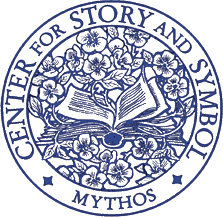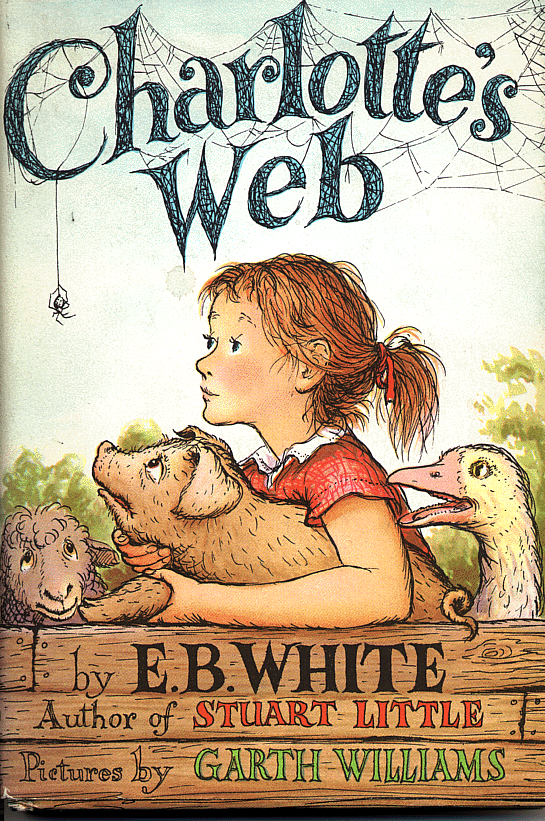
Jonathan Young: The Radiant Life
Register Articles Joseph Campbell Search
In a lifetime, there are a few stories that light up the imagination so vividly they change how we see the world. Such a tale is Charlotte's Web. Fern, a good-hearted farm-girl rescues a pig from her father's axe. The pig would have died simply because he was a runt. Right off, the story is really about our own experiences. We have all felt like runts at some time. We are each, like Wilbur, discovering that life is a risky proposition.
From his first days, Wilbur is protected by his substitute mother. Fern bottle feeds him and wheels him around in a pram. This is the innocence of early childhood, the universal Garden of Eden. It is lovely, but cannot last. Once Wilbur grows too big to be a pet, he moves to Uncle Homer's farm. The Zuckerman barn is an unwelcoming community of various animals. This move could represent our introduction to social life. Things do not go well. Wilbur is terribly lonely.
The one creature in the barn welcoming the newcomer is Charlotte, the spider. Wilbur has been complimentary to everyone. He seems delighted in the smallest things. Still, only Charlotte sees his fine qualities. Then again, Wilbur is the only one who thinks Charlotte is beautiful. This mutual appreciation is absolutely genuine. The others have simply not made the effort to see past the surface.

When Wilbur learns that he will be sentenced to the smoke house before winter, Charlotte promises to literally save his bacon. The bond is formed. The word used in the story is friend, but Charlotte is really more of a mentor to Wilbur.
Essentially, a mentor is someone who knows more and is willing to share the knowledge. The spider has a larger perspective that helps in the hour of darkness. "Should I worry?" asks Wilbur. "Of course not," Charlotte replies, "what good would that do?" When we are caught up in troubles, a mentor can help by giving us new ways of seeing.
Charlotte's Web takes an unflinching look at hard parts of life. Charlotte serenely faces the worst, "We're born, we live a little, and we die." She manages to calm Wilbur in the face of looming slaughter. Coping with our fear of death is a challenge. It takes courage not to be immobilized by awareness of our mortality.
Charlotte intends to use the web to communicate in a story set well before the internet. This articulate webmistress is a spin doctor who will use the power of public relations to shape Wilbur's image. She brings a calm wisdom into an anxious situation, bolstering his self-image by spelling out his best aspects.
The other animals don't think much of Wilber at first. He is something of a lost soul when he arrives. Only gradually do they perceive his charm and enthusiasm. By the time the spider spins her words, everyone in the barn is rooting for Wilbur. Gradually, he becomes known far and wide through her artistic wordsmithing.

The story reminds us that identity is formed in relationships. Wilbur doesn't know he is Some Pig until Charlotte tells him. Still, this is not a story about a victim who does nothing to save himself. To see Wilbur as passive would be missing his subtle gifts. Wilbur is consistently caring and engaging. These are not small contributions to the social fabric. He affirmed every member of the barn community. He formed a bond with Charlotte because he saw her beauty. He is the most accepting and positive member of the barn gang. He brought a lovely soulful dimension into that place.
It is crucial to appreciate that Wilbur does his part. As Charlotte spins, he digs down and finds ways to be radiant. When the crowd gathered, Wilbur blinks his long eyelashes and smiles up at the gathered throng. Then, for dramatic emphasis, he springs into the air and does a backflip. He is giving this project his all. Wilbur and Charlotte are a winning partnership. It works. First, the Zuckermans, and then the whole town, are marveling that this is no ordinary pig.
Charlotte did not create Wilbur's fine qualities, she just noticed them. He even protested that he did not feel particularly terrific, but she knows better. It is crucial that a mentor celebrates true qualities. The magic is that caring attention allows a glimpse beneath the surface.
Wilbur's stay of execution is temporary. Maybe if he wins the blue ribbon at the county fair, he will be allowed to live to see snow. Charlotte is a fine wordsmith, adding terrific and finally humble to the web over the fair stall. This last word is perfect. Fame has not changed Wilbur. He is still an unassuming, unpretentious little pig.

The events have certainly changed Homer Zuckerman. He makes a speech to the gathered crowd. In it, he says we just need to have eyes that are able to see miracles when they happen in the midst of our ordinary days. By now, the magic has touched everyone.
There are good reasons that this is the bestselling children's paperback of all time. Charlotte's Web is a celebration of the quiet virtues, like keeping a tender heart, accepting one's true nature, and valuing the unique gifts of others.
The story has many mythic parallels. Charlotte is akin to Penelope from the Odyssey, weaving and unweaving her web to stall off an unwanted event. She also reminds us of the Navajo tales of Spider Woman, who controls the elements with her web.

There are also hints of Ariadne who spun the guiding thread that made it possible to escape the labyrinth. We might also think of the three fates. One would spin the thread of life. Another measures out the length. A third cuts to provide termination. Of these, the second of the fates would be the primary model for this story. Charlotte's spinning lengthened the number of Wilbur's days.
Charlotte's Web was first published in 1952 and has now been loved by generations of children. Responding to a young reader, author E. B. White once wrote: "In real life, a spider doesn't spin words in her web. . . . But real life is only one kind of life - there is also the life of the imagination." The memorable details of this story linger on. Any tale that can so enrich the inner life is a treasure.
One way to consider this very dream-like tale would be as a drama unfolding entirely in the imagination. In this view, each of the characters would represent an aspect within. After all, the tale came out of the head of one writer and goes into the imagination of one person at a time.
Looking at it as a mirror of the inner life, Wilbur would be the vulnerable insecure identity at the center of awareness. Charlotte would represent a higher self who provides wisdom and help from above. In the world within, we are never alone. We each have a colorful cast of inner characters who bring differing gifts to the project of life. They may not seem attractive to others, but we know their true worth.
The story shows that each of us, in our own ways, can be radiant and terrific. It also reminds us in moments of glory to remain humble. Not all wisdom tales are so enchanting. Charlotte's Web is one for the ages.